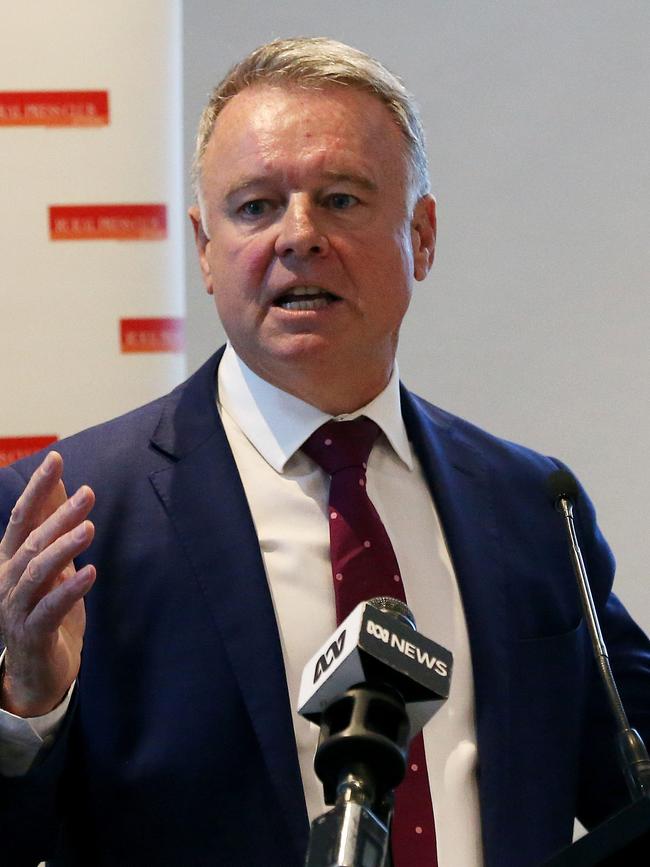Sharri Markson: Labor angst over tax cuts will only get worse
While Labor is in disarray the Coalition is more united than at any point since 2013, writes Sharri Markson.
It was an arduous process for Labor to arrive at the decision to pass the government’s tax cuts for high-income earners.
Former deputy leader Tanya Plibersek is understood to have been the most vocal in Shadow Cabinet, passionately arguing Labor should vote against the package because it is irresponsible to commit $137 million to tax relief in two elections time.
“It doesn’t get any more left than Tanya,” one MP commented on her advocacy behind-the-scenes.
Despite his ferocious attacks during the election campaign, I’m told a mellower Bill Shorten remarked in Shadow Cabinet that Labor should vote in favour of the tax cuts if their amendments failed, a position with which Kristina Keneally agreed.

One source present said Shorten was marginally more lively than his demeanour in Question Time, where he only glanced up infrequently as debate raged around him.
“He was more engaging, quiet but not silent,” one MP present said.
The arguments mostly played out in the week before the formal discussion, where the fight was restricted to behind-the-scenes discussions, apart from early interventions by right-faction warriors Joel Fitzgibbon and Peter Khalil, and West Australian MPs like Patrick Gorman who opposed passing the government’s package.
In the end, caucus left it up to Shadow Cabinet to make the final decision, and tax cuts went through smoothly without a significant stoush.
This was mostly because those who were against stage three knew they lacked the numbers and, ultimately, gave up the fight.
Anthony Albanese masterfully got to the position he probably always intended to arrive at, but in choosing to allow the process — rather than walk in with a presumed outcome like Shorten and his leadership team would have done — he maintained a degree of unity and inclusiveness within Labor.


He allowed opponents to publicly prosecute the case against stage three while ensuring Labor still voted sensibly in the Senate.
“The whole strategy was to show the left-flank that we will take up the fight,” one source said.
Albanese has indicated the party will not be one that tries to govern from opposition. He won’t vote against legislation if it has merit.
But he is also under implied pressure from his left-faction to remain true to his ideological grit.
And already he is facing a backlash from the left, with commentator Van Badham yesterday writing of Albanese that “those who yearned for a dog in the political brawl who would show more teeth than the conciliatory, consensus politician Bill Shorten, have just watched their political animal enter its first actual fight, and roll over.”
This pressure from the left-flank will continue to build as Albanese moves towards a more centrist approach to policy, aware that this is his only path to victory at the next election.
Labor now has to go through a similar process on Peter Dutton’s six pieces of legislation introduced to the Parliament, including temporary exclusion orders. Usually, Labor’s stance on each area of legislation would be well established. Now, they need to rethink their approach to the most basic policy positions.
MORE OPINION
JONES: THE DAILY TELEGRAPH: FAIR DINKUM ‘THE PEOPLE’S PAPER’
DEVINE: JODI McKAY IS NO MATCH FOR GLADYS
BOLT: PROGRAMS CAN’T FIX HATRED OF AUSTRALIA
Even Labor’s 50 per cent renewable energy target will be reviewed, as confirmed by Matt Thistlethwaite when I interviewed him on Sky News this week.
This is major policy upheaval.
By contrast, the Coalition is more united than at any point since Tony Abbott’s landslide 2013 win.
It’s a significant change from the disunity that had become the status-quo inside the party.
Mathias Cormann, who has suffered from his role in the election coup, is now being described by colleagues as a “genius in his negotiating strategy”. Michael McCormack also has a new-found authority in the Nationals’ party room, looking more comfortable in his own skin as leader with, as one MP put it, “the bogeyman of Barnaby over his shoulder” dissipating.
And what a couple of months for the Prime Minister: shocking the pundits to win the election, a successful trip overseas where he cemented a relationship with US President Donald Trump, and a critical victory in the first week of Parliament legislating historic tax reform.
Scott Morrison will now quickly move to fulfil RBA Governor Philip Lowe’s request for fiscal policy to complement the rate cuts.
Morrison couldn’t very well cite the RBA when urging crossbench support for tax cuts but then ignore its demand for further fiscal policy to stimulate the economy.
Firstly, Morrison, Josh Frydenberg and Alan Tudge are discussing with the states which of the 166 projects from the $3 billion urban congestion fund can be fast-tracked.
They’re not looking at the large-scale infrastructure projects, which have a bigger lead time with planning, compulsory acquisitions and community consultations.
Secondly, the Morrison government will focus on lifting constraints for small businesses, particularly reducing the time it takes small business to be paid from 30 to 20 days, so there is more money for payrises and to spend in the economy.
Morrison’s IR agenda and trade deals will both also be a major stimulus for business. The federal election, and uncertainty about Labor’s policies, were a shackle for the economy, and already house prices in Sydney and Melbourne are showing signs of recovery.
One ambitious item on Morrison’s agenda is to secure the Olympic Games for Australia again.
Pulling this off would certainly be yet another miracle coup for the Prime Minister.


